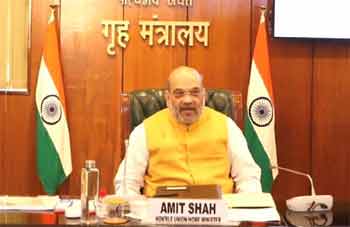INVC NEWS
New Delhi : As the political landscape in Jammu and Kashmir undergoes significant shifts following the Lok Sabha elections, three major changes are set to redefine the region’s governance and security dynamics. The central government, along with the army and local administration, is gearing up for these transformative steps that hold profound implications for the state’s future.
Removal of Armed Forces Special Powers Act (AFSPA)
One of the pivotal changes on the horizon is the anticipated removal of the Armed Forces Special Powers Act (AFSPA) from Jammu and Kashmir. This move, hinted at by Union Home Minister Amit Shah, marks a significant departure from the status quo and signals a shift towards a more normalized security environment in the region.
Granting Full Statehood Status
Another crucial development is the proposal to grant Jammu and Kashmir full statehood status. With preparations already underway at the grassroots level, this initiative aims to empower the local populace and provide them with greater autonomy in governing their affairs. By reinstating full statehood, the region is poised to reclaim its rightful place within the Indian Union, ushering in a new era of governance and accountability.
Early Assembly Elections
In a bid to facilitate a seamless transition towards local governance, plans are underway to conduct assembly elections in Jammu and Kashmir before September 30. This strategic move not only reflects the government’s commitment to democratization but also ensures that the reins of power are entrusted to elected representatives, thereby fostering a sense of ownership and responsibility among the local populace.
Focus on AFSPA Removal: Army’s Role and Preparedness
The impending removal of AFSPA has emerged as a focal point in the transition process, with concerted efforts being made to prepare for this landmark change. The Indian Army, in collaboration with the state police, is actively involved in equipping and training personnel to handle anti-terror operations effectively.
Training of State Armed Police
At the forefront of these preparations is the training of the State Armed Police to assume a more prominent role in maintaining law and order post-AFSPA. Over 1100 police inspectors are currently undergoing rigorous training at the Army’s Battle School in Barla, Doda. This training regimen encompasses a wide array of skills, including intelligence analysis, tactical deployment, and counter-insurgency strategies, aimed at enhancing the state police’s capabilities in tackling security challenges.
Strengthening Collaborative Efforts
The collaborative efforts between the Army and the Jammu and Kashmir Police have been instrumental in fostering trust and synergy in counter-terrorism operations. The central government’s increasing reliance on the state police underscores its growing confidence in their ability to handle complex security scenarios.
Recognition and Rewards
The valor and dedication displayed by Jammu and Kashmir Police personnel have not gone unnoticed, with several individuals earning accolades and honors for their exemplary bravery.
Transitioning from Military to Civilian Oversight
With the removal of AFSPA on the horizon, plans are underway to transition from a predominantly military-led security framework to one characterized by greater civilian oversight and control.
Role of Rashtriya Rifles
Following the withdrawal of AFSPA, the deployment of Rashtriya Rifles, comprising 63 battalions, is expected to play a pivotal role in maintaining security in the region. These specialized units, drawn from the Army on deputation basis, are poised to assume responsibilities previously held by regular Army units, thereby facilitating a smooth transition towards civilian governance.
Rebalancing Military Deployments
The anticipated shift in security dynamics is also likely to result in the reallocation of military resources, with a portion of the 1.25 lakh army personnel currently stationed in Jammu and Kashmir being redeployed to the Pak-China border. This strategic realignment reflects a broader geopolitical calculus aimed at optimizing military capabilities and addressing emerging security challenges on multiple fronts.













